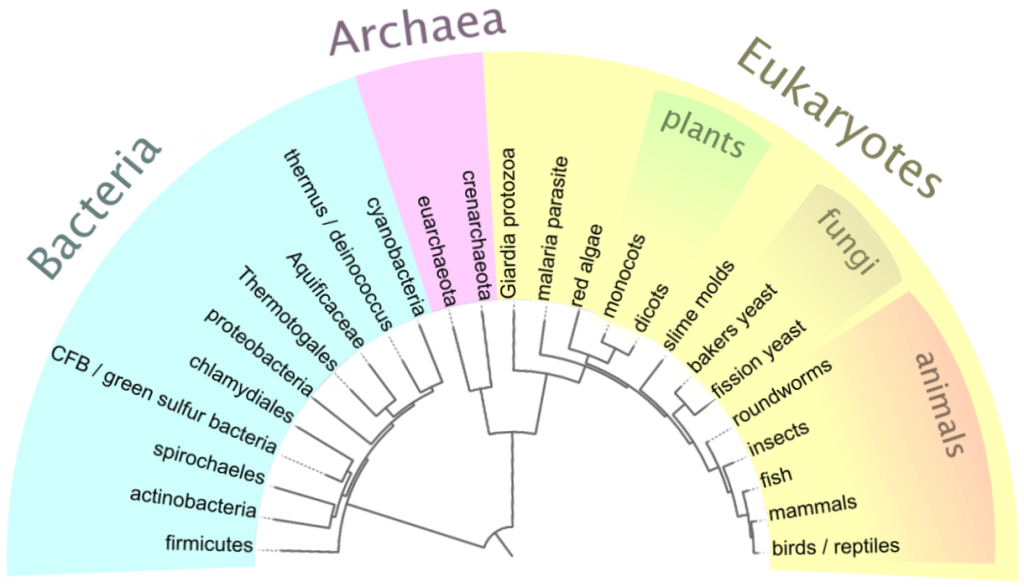Listen to Episode 100 on PodBean, Spotify, YouTube, or wherever else you can find it!
As far as we can tell, all life on Earth is descended from a common ancestry. But there are so many open questions about when, where, and how life got started. In this episode, we tackle some of the biggest questions in the universe as we discuss The Origin of Life.
In the news
Evidence of a dinosaur bone infection and possible blood parasites
These extinct amphibians had bodies and tongues like chameleons
Fossilized social groups of Mesozoic mammals
Pterosaur tooth wear shows how diets changed over time
What is Life?
It’s easy to identify a living thing when you see it – a bacterium, a tree, a hamster. But what exactly is life? What makes something living?
Is life any matter that “avoids the decay into equilibrium” as Erwin Schrödinger suggested? Or is life a “self-sustaining chemical system capable of Darwinian evolution” as proposed by a 1994 committee of experts? Does a living thing need to adhere to the “Seven Pillars of Life” outlined by Daniel E. Koshland? Here on Earth, all life is built from carbon-based molecules, is organized by DNA, and relies on water, but is that the only way for life to be?

[Image: Madprime / Public Domain]
Scientists and philosophers have debated for centuries over this question, and there’s no end in sight. We might arrive at a solid definition, and if we do, it might be upended by the discovery of something strange in our fossil record or on another world.
Whatever life is, we’re confident of this: Earth didn’t always have it; at some point, life on Earth got started.
Earth’s First Organisms
The Earth formed about 4.6 billion years ago, and with frustratingly little evidence from that long ago, we don’t know much about the planet in it’s earliest several million years, but we know this: it was a rough place.
The Early Earth had an atmosphere that was probably similar in composition to volcanic gases and a surface with frequent volcanic activity and only the earliest hints of today’s landmasses. The atmosphere provided little protection against dangerous radiation and even less protection against frequent asteroid impacts. The first ~800 million years of our planet’s history are called the Hadean Eon – hell on Earth.

And yet, somewhere in that chaos, life got started. The oldest uncontroversial evidence of life on Earth are stromatolites, layers deposited by microbial mats, dating back 3.5 billion years. But there are various accounts of chemical evidence that might represent living activity in rocks going back over 4 billion years.
Abiogenesis: Non-Life to Life
In this podcast, we talk all the time about how gradual, incremental changes are responsible for the evolution of new species, new traits, and entirely new lifestyles (see: birds, flowers, insects, and many more). Well, scientists suspect life arose in a similar fashion: step-by-step. The famous Oparin-Haldane hypothesis, proposed in the 1920s, suggests life came about as a result of “gradual chemical evolution.”
After all, life is chemicals and chemical reactions, and a lot of this chemistry is found outside of living things. Experimentation has shown many times in many ways how molecules important for life (such as amino acids and nucleic acids) can form outside of living cells given the right conditions, including simulations of the conditions of early Earth. These experiments include the famous Miller-Urey experiment in 1953, and many more since.

But exactly how this happened, and in what order, is hard to say. Some scientists have favored a “metabolism-first” model, where self-sustaining bundles of chemical reactions could have produced the kinds of molecules and behaviors of metabolism, before later developing a genetic system of passing along information. The more popular hypotheses these days are “genes-first” models, specifically the idea that RNA (a form of genetic molecule we still use today) might have acted as chemical reactant, catalyst, and information-vessel for early life-like reactions, which later took on more familiar features of living metabolism. Ultimately, some version of this bundle of chemical reactions took on a form familiar enough that we might call it a cell – a living thing.
As you can imagine, there’s a lot we don’t know here. What steps did it take to form the first life? Did it happen only once, or were there many origins of life (we know, at least, that all modern life seems to share an ancestry)? Did life originate on the hellish surface of the planet, or – as many suspect – around chemical-rich hydrothermal vents? Did the ingredients for life come from space? Is Earth the only place where life arose, or is there more life waiting to be found elsewhere?

So Much More to Learn
Defining Life (non-technical)
Defining Life (technical)
The origin of life: what we know, what we can know, and what we’ll never know (technical)
What Was the First Life on Earth? (non-technical)
Possible oldest life in Greenland (non-technical)
Possible oldest life in Canada (non-technical)
Possible oldest life around hydrothermal vents (technical)
Looking for LUCA, the Last Universal Common Ancestor (non-technical)
What is the RNA World Hypothesis? (non-technical)
The Origins of the RNA World (technical)
Are Viruses Alive? (non-technical)
—
If you enjoyed this topic and want more like it, check out these related episodes:
- Episode 22 – Micropaleontology
- Episode 26 – Astrobiology
- Episode 9 – The Cambrian Explosion
- Episode 31 – The Ediacaran Biota
We also invite you to follow us on Twitter, Facebook, or Instagram, buy merch at our Zazzle store, join our Discord server, or consider supporting us with a one-time PayPal donation or on Patreon to get bonus recordings and other goodies!
Please feel free to contact us with comments, questions, or topic suggestions, and to rate and review us on iTunes!
Hello,
I am listening to this in 2024 but I love the podcast, which is already a miracle because I don’t typically like podcasts. I found the podcast this last year and have been listening to at work and I have learned SO much. I love the dad jokes and the banter you guys have. I love when David says ‘yup’, i find myself just repeating that in my head over and over again. He made a joke about dear listeners and human listeners and I think about that everyday. I love Will’s giggle and how excited he gets about topics. You guys make my work day more enjoyable!!
Mecarte (pronounced like bacardi)
LikeLiked by 1 person
Thanks so much for listening, human listener!
LikeLike